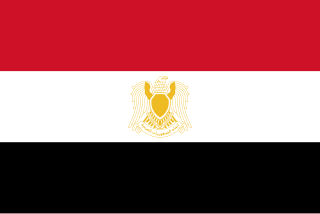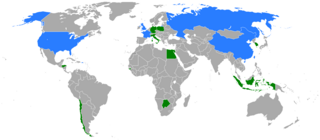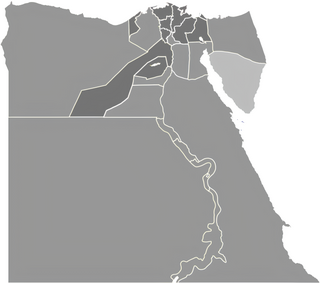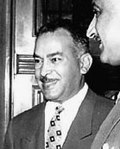The politics of Egypt takes place within the framework of a republican semi-presidential system of government. The current political system was established following the 2013 Egyptian military coup d'état, and the takeover of President Abdel Fattah el-Sisi. In the current system, the President is elected for a six-year term. Furthermore, the President has the power to dissolve Parliament through Article 137. The Parliament of Egypt is the oldest legislative chamber in Africa and the Middle East. The unicameral Parliament has the ability to impeach the President through Article 161. With 2020 elections to the new Senate, the chamber became bicameral.

The United Arab Republic was a sovereign state in the Middle East from 1958 until 1961. It was initially a short-lived political union between Egypt and Syria from 1958 until Syria seceded from the union following the 1961 Syrian coup d'état. Egypt continued to be known officially as the United Arab Republic until it was formally dissolved by Anwar Sadat in September 1971.

The president of the Arab Republic of Egypt is the executive head of state of Egypt and the de facto appointer of the official head of government under the Egyptian Constitution of 2014. Under the various iterations of the Constitution of Egypt following the Egyptian Revolution of 1952, the president is also the supreme commander of the Armed Forces, and head of the executive branch of the Egyptian government.

The National Democratic Party, often referred to in Egypt as simply the National Party, was the ruling political party in Egypt from 1978 to 2011. It was founded by President Anwar Sadat in 1978. The NDP wielded uncontested power in state politics, usually considered a de facto single party, with authoritarian characteristics, inside an officially multi-party system, from its creation until the resignation of Sadat's successor Hosni Mubarak in response to the Egyptian Revolution of 2011.

The state of Democracy in Middle East and North Africa can be comparatively assessed according to various definitions of democracy. De jure democracies in the Middle East and North Africa are according to system of government:

The Federation of Arab Republics was an unsuccessful attempt by Muammar Gaddafi to merge Libya, Egypt and Syria in order to create a unified Arab state. Although approved by a referendum in each country on 1 September 1971, the three countries disagreed on the specific terms of the merger. The federation lasted from 1 January 1972 to 19 November 1977.

The Parliament of Egypt is the bicameral legislature of the Arab Republic of Egypt. It is composed of an upper house and a lower house.

The Constitution of Egypt has passed over a long period of evolution from the liberal constitution of 1923 to the contemporary constitution.
The Provisional Constitution of the United Arab Republic or the Constitution of 1958 was the constitution for the short-lived political union between Egypt and Syria known as the United Arab Republic (UAR). This 74-article provisional constitution was formulated on 5 March 1958 and lasted until the Syrian coup d'état of 28 September 1961.

National Association for Change(Arabic: الجمعية الوطنية للتغيير) is a loose grouping of the various Egyptian of all political affiliations and religion, men and women, including representatives of civil society and young people aims to change Egypt. There was general agreement on the need to unite all the voices calling for change within a National Assembly. Mohamed ElBaradei is in-charge of the National Association for Change. The movement aims for general reforms in the political scene and achieving some of those procedures and guarantees necessitates the amendment of articles 76, 77, and 88 of the constitution as soon as possible. Worth mentioning is that the banned political group the Muslim Brotherhood were represented by one of their key figures who attended the meeting however their stand in accepting a non-member of their group as a candidate is yet unclear. It is also unknown whether Amr Moussa the head of the Arab League who met with Elbaradei a day earlier will be part of the new movement. The goal of the group is to bring about political reform based on democracy and social justice.

Parliamentary elections were held in Egypt on 3 July 1957, having originally been scheduled for November 1956, but postponed due to the Suez Crisis. They were the first elections since the 1952 revolution, which saw King Farouk overthrown, the Republic of Egypt established and the approval of a new constitution in a June 1956 referendum.
Parliamentary elections were held in the United Arab Republic on 8 January 1969, with a second round in 13 constituencies on 13 January. At the time the country was a one-party state and all candidates had to be members of the Arab Socialist Union (ASU). Two candidates were elected from each of the 175 constituencies, with a second round of voting required if one or both of the candidates failed to win over 50% of the vote in the first round, or neither of the candidates with over 50% were classed as a worker or farmer.

Presidential elections were held in the United Arab Republic on 15 March 1965. The election took the form of a referendum on the candidacy of Gamal Abdel Nasser, who ran unopposed. He allegedly won with almost seven million votes, and only 65 against. Voter turnout was stated to be 99%.

A referendum on the Federation of Arab Republics was held in Egypt on 1 September 1971, alongside simultaneous referendums in Libya and Syria. It was approved by 99.96% of voters, with a turnout of 98.1%.

A constitutional referendum was held in Egypt on 19 March 2011, following the 2011 Egyptian revolution. More than 14 million (77%) were in favour, while around 4 million (23%) opposed the changes; 41% of 45 million eligible voters turned out to vote.

The 1997 United Nations Security Council election was held on 14 October 1997 at United Nations Headquarters in New York City during the 52nd session of the United Nations General Assembly. The General Assembly elected five non-permanent members of the UN Security Council for two-year terms commencing on 1 January 1998.

The 1995 United Nations Security Council election was held on 8 November 1995 at United Nations Headquarters in New York City during the 50th session of the United Nations General Assembly. The General Assembly elected five non-permanent members of the UN Security Council for two-year terms commencing on 1 January 1996.

Presidential elections were held in Egypt between 26 and 28 May 2014. There were only two candidates, former Egyptian defence minister Abdel Fattah el-Sisi and Egyptian Popular Current candidate Hamdeen Sabahi. El-Sisi won the election in a landslide victory, having received 97% of votes. The elections were marred by irregularities, repression of el-Sisi's political opponents, and suppression of free speech.

The Federal National Assembly was the parliament of the Federation of Arab Republics.

Presidential elections were held in Syria on 26 May 2021, with expatriates able to vote in some embassies abroad on 20 May. This was the last presidential election to be held in Ba'athist Syria, prior to its overthrow following the 2024 Syrian opposition offensive.

















